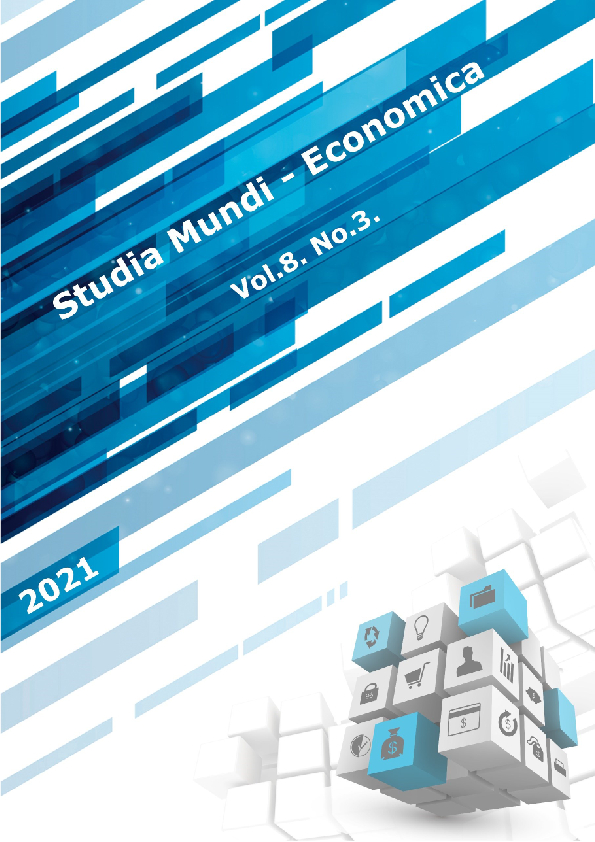Analysis of consumption behavior related to local products and their online distribution
DOI:
https://doi.org/10.18531/Studia.Mundi.2021.08.03.156-167Kulcsszavak:
local product, short supply chain, marketing channels, agriculture, competitivenessAbsztrakt
While the literature and the EU’s agricultural policy emphasize the role of local products and short supply chains (SSC), the market opportunities for small farmers are increasingly barren due to the price-depressing effect of large multinational firms, which can also be seen in local networks. The main goal of the paper was to examine how the local market as a classic form of the short supply chain can be characterized and whether its operation could be helped by modern solutions. The involved primary research has focused on the opinion of the farmers and costumers about Hungarian and local products in the Kecskemét micro region as a traditionally agricultural area. Using questionnaires and in-depth interview method the shopping habits and preferences of the costumers and the experience of the farmers concerning to local food and SSC were analyzed on the local market of the micro regional center in Kecskemét city. During the research there was a focus on the communication channels and the information flow between the producers and consumers. Based on the results the consumers consciously buy and prefer local agricultural products creating a good economical basis for local farmers. However there is a definite need for better communication and more information in SSC. Modern solutions and marketing channels (e.g. web shops, direct websites, Facebook profiles and other IT solutions) have been identified as key factors.
Hivatkozások
Balázs, B. (2012): Local food network development in Hungary. International Journal of Sociology of Agriculture and Food 19 (3) 403-421. p.
Balázs, B. – Simonyi, B. (2009): Együtt a helyi élelmiszer rendszerekért (Together for local food systems) – Civil összefogás a kistermelői rendelet módosítására. Védegylet, ESSRG, Budapest.
Benedek Zs. (2014): A rövid ellátási láncok hatásai (Impacts of short supply chains.). MTA Közgazdaság- és Regionális Tudományi Kutatóközpont, Budapest
Benedek Zs. – Fertő I. – Baráth L. – Tóth J. (2013): Hogyan kapcsolódhatnak a mezőgazdasági termelők a modern élelmiszerláncokhoz? (How can farmers connect to modern food chains?) A rövid ellátási láncok működésének hazai sajátosságai: egy empirikus vizsgálat tapasztalatai. Vidékkutatás 2012-2013, NAKVI, Budapest
Gallastegui G. I. (2002): The Use of Eco-Labels: A Review of the Literature. European Environment 12 (6) 316–31. p.
Gorotyák I. (2013): Rövid élelmiszerellátási láncok és vidékfejlesztés (Short food supply chains and rural development). Szakdolgozat. EJF, Szeged
Imreh Sz. – Deák I. - Kosztopulosz A. – Kürtösi Zs. – Lukovics M. – Prónay Sz. (2013): Gazdasági alapismeretek I. (Basic of economics I.), online oktatási csomag, https://u-szeged.hu/tamop412e-0011-belso/digitalizalt-tananyagok/digitalizalt tananyagok?folderID=26601&objectParentFolderId=26601Letöltve: 2020.02.18.
Juhász A. (Edit.) (2012): A közvetlen értékesítés szerepe és lehetőségei a hazai élelmiszerek piacra jutásában (The role and opportunities of direct sales in the market access of domestic foods) – Élet a modern kiskereskedelmi csatornákon kívül? Agrárgazdaságtani Kutató Intézet, Budapest.
Juhász A. – Szabó D. (2013): Piacok jellemzői fogyasztói és termelői szemmel (Characteristics of markets from the perspective of consumers and producers). Agrárgazdaságtani Kutató Intézet, Budapest
Kotler P. - Keller K. L. (2006): Marketingmenedzsment (Marketing Management). Budapest: Akadémiai Kiadó, 921. p.
Kuslits B. – Kocsis T. (2018): Körforgás, visszacsatolás a fenntartható élelmiszerpiacon (Circulation, feedback in the sustainable food market). Lépések 23 (2) 6–7. p.
Kuslits B. – Kocsis T. (2019): Visszatérés a piachoz: fenntartható élelmiszer fogyasztás Budapesten (Return to the market: sustainable food consumption in Budapest). Magyar Tudomány 180 (6) 884–893. p.
Lehota J. – Csíkné M. É. (2012): Értékesítési sajátosságok - közvetlen értékesítési csatornái (Sales Features - Direct Sales Channels). 117-155. p. In: Szakály Z. (Edit.): Agrártermékek közvetlen értékesítési marketingje (Direct sales marketing of agricultural products). Magyar Agrárkamara, Budapest, 251. p.
Nagy Sz. (2019): Az ár, a minőség, a márkanév és a környezetbarátság fontossága a vásárlói döntések során (The importance of price, quality, brand and environmental friendliness in customer decisions). 252-264. p. In: „Mérleg és kihívások” - XI. International Scientific Conference. (11.)(2019)(Miskolc-Lilafüred). University of Miskolc, Faculty of Economics, Miskolc
OECD (1995): Niche Markets as a Rural Development Strategy. OECD, Paris
Péter E. - Illyés L. (2019): A helyi értékesítés szerepe Csíkszereda és vonzáskörzetében (The role of local sales in Miercurea Ciuc and its agglomeration). Gazdálkodás, 63 (3) 204-217. p.
Póla P. (2014): Rövid Élelmiszer láncokkal a vidék fejlesztéséért (Short Food Chains for Rural Development). http://www.mvh-hacs.hu/tanulmanyok Letöltve: 2020.02.18.
Ritter K. (2008): A helyi fejlesztés esélyei – agrárfoglalkoztatási válság és területi egyenlőtlenségek Magyarországon (Possibilities of local development - agricultural unemployment and territorial disparities). Területi Statisztika 48. (5) pp. 554-572.
Ritter K. (2014): Possibilities of local economic development (LED) in lagging rural areas. Acta Carolus Robertus 4 (1) pp. 101-108.
Ritter K. (2018): Special features and problems of rural society in Hungary. Studia Mundi - Economica 5. (1) pp. 98-112. doi: https://doi.org/10.18531/Studia.Mundi.2018.05.01.98-112
Varga J. (2016): A helyi pénzek megjelenése és szerepe a gazdaságban (The appearance and role of local money in the economy). 161-207. p. In: Kerekes S. (Edit.): Pénzügyekről másképpen: Fenntarthatóság és közösségi pénzügyek. Budapest: CompLex Wolters Kluwer, 303. p.
Varga J. (2017): A Chiemgauer, mint sikeres helyi pénz működése (Chiemgauer as a successful local money). Közép-Európai Közlemények 10 (2) 91-100. p
Letöltések
Megjelent
Folyóirat szám
Rovat
License
Copyright (c) 2021 Zsolt Ádám Orbán

This work is licensed under a Creative Commons Attribution-NonCommercial-NoDerivatives 4.0 International License.
A folyóirat Open Access (Gold). Cikkeire a Creative Commons 4.0 standard licenc alábbi típusa vonatkozik: CC-BY-NC-ND-4.0. Ennek értelmében a mű szabadon másolható, terjeszthető, bemutatható és előadható, azonban nem használható fel kereskedelmi célokra (NC), továbbá nem módosítható és nem készíthető belőle átdolgozás, származékos mű (ND). A licenc alapján a szerző vagy a jogosult által meghatározott módon fel kell tüntetni a szerző nevét és a szerzői mű címét (BY).






